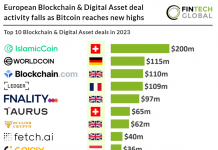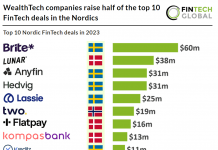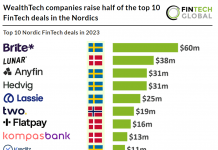Bitcoin has been on a roller coaster ride over the past year, but the reason behind its recent record spikes may not be what you think.
Bitcoin hit another record high this week with its valuation being set at $44,220. The skyrocketing valuation came after Elon Musk revealed that Tesla had invested $1.5bn in the cryptocurrency.
The news came after a year where bitcoin and other digital assets such as ethereum continuously beat new records, encouraging celebrities like Musk and actors like Game of Thrones’ Maisie Williams to invest in them.
“In terms of mainstream adoption and getting accepted in the public view, 2020 has been the most significant year for bitcoin of all time,” said Eric Wall, chief investment officer at Scandinavian cryptocurrency investment firm Arcane Assets, when speaking at the Sthlm Fintech Week on Tuesday February 9.
However, you could’ve been forgiven at beginning of 2020 if you thought that this wide-spread adoption wouldn’t happen. In the first quarter, the price dramatically dropped from $10,277 to $5,324, according to CoinMarketCap. “It was a massive collapse,” Wall said.
The collapse of the bitcoin price was due to a lot of people selling their bitcoins as the Wuhan epidemic turned into a full scale pandemic, Wall said. As the stock markets fell, many traders sold their assets, which resulted in a vicious cycle where the price fell and motivated more people to sell their bitcoin, which again caused the price to plummet further.
Bitcoin was by no means the only asset to be caught in the frenzy of the trading chaos of the early days in the pandemic. In fact, the market became so volatile that stock-trading app Robinhood’s services repeatedly went down in that period.
“[But bitcoin] had a much larger drop than other asset classes,” said Wall. “And that was the reason why a lot of people got worried about bitcoin, [wondering] if it really was going to be this asset that we had dreamed of it becoming.”
Nevertheless, bitcoin did rally over the year, partly due to the fact that the similarities that are sometimes drawn between the digital asset and gold aren’t that far-flung.
Wall explained that a similar selling-frenzy happened for gold at the beginning of the 2008 financial meltdown as people moved to liquidate their assets, causing the price to drop. However, just like with bitcoin, the price soon recovered.
“if you understand [how] these markets work [then] you can sort of understand that this is generally a good time to buy, if you have some capital on the sidelines, and you see the price of an asset like gold or bitcoin collapsing during a crisis, that can be the ideal moment of opportunity for you to enter the market,” Wall said.
Another reason for the growing popularity of cryptocurrencies was the fact that countries put more money into circulation to cover the cost of their pandemic responses. However, the result of that was that the value of currencies like the dollar became diluted.
This again encouraged more people to invest in bitcoin, Wall argued. “An asset like gold where the supply is constrained, where it’s fixed, that’s an asset that will typically do well in relation to to the US dollar and the same thing [goes] for bitcoin,” he said.
“And the magnitude of this crisis, and the magnitude of the response from the central banks [are] actually completely unprecedented. If you look at it in historical terms, [in] the modern age, I don’t think that we have seen anything nearly like it.”
Knowing this, he said that he was able to offer an optimistic analysis when media companies called him to ask what was going on with the bitcoin price. “I was not the only one that said that, ‘yes, it looks very bad right now, but I’m expecting that bitcoin will reach peak levels by the end of the year,'” Wall said.
Over the year, more investors and hedge funds have started to open their eyes to the possibilities of the cryptocurrency.
Ray Dalio, founder of the world’s biggest hedge fund Bridgewater Associates, is one of the people who have seemingly changed their minds.
“I believe bitcoin is one hell of an invention,” Dalio recently said. “To have invented a new type of money via a system that is programmed into a computer and that has worked for around ten years and is rapidly gaining popularity as both a type of money and a storehold of wealth is an amazing accomplishment.”
He added that he believed that bitcoin and similar digital assets could soon become alternative “gold-like assets”, helping to meet the demand for such assets.
To Wall, this marked a significant change in how incumbents think about bitcoin. “This is extremely important because it means that now hedge funds all over the world are starting to look at bitcoin as something that belongs in their investment portfolios,” he said.
More institutions are investing in bitcoin, demonstrated by the fact that the wallets hosting bitcoin are becoming bigger.
This, Wall said, was also exemplified by the fact that the bitcoin ledger demonstrates that “there are more and more large wallets popping up that shows that the institutions are building out positions in bitcoin”.”
“And this is just a long list of hundreds of different types of announcements from hedge funds,” he said
If you want to find out more about where the Swedish ecosystem is going, make sure you swing by Sthlm Fintech Week on February 9 and 10. FinTech Global is a media partner of Sthlm Fintech Week.
Copyright © 2021 FinTech Global











